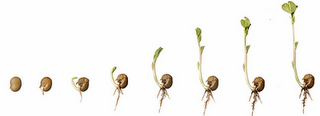Archive for March, 2012
Spring is here! And the Seedy Saturday (and Sunday) Seed Exchanges throughout Canada are going fast. (I have a new garden to play with this year, so I’m rather excited.)
I haven’t managed to make it to one of these exchanges, where you can buy heirloom and rare seeds for your garden (or balcony), BUT the next two exchanges in my area are entered in my phone. Really.
For dates in your area, see the Seeds of Diversity site.
If there isn’t a seed exchange near you, here are some worthy-of-your-$ seed suppliers that also do good work to preserve seed heritage:
Seeds of Diversity Resource List 2012
If you’re in Toronto, Urban Harvest sells directly at these farmers’ markets:
- Dufferin Grove Thursdays 3-7 year round
- Wychwood Barns Saturdays 8-1 year round
- Leslieville Sundays 9-2 until late October
If you have some old seed packages on hand, left over from previous years, but are wondering if they might be genetically modified, visit the Safe Seed Resource List for 2012, by the Council for Responsible Genetics. This lists seed companies that have signed the Safe Seed Pledge, promising to “not knowingly buy or sell genetically engineered seeds or plants.”[1]
If you can’t find the brand you have on hand, I will humbly submit that you refresh your seed stock with organic or heritage seeds. After all, if you’re going to take the time and energy to grown your own food, make it worth it!
A food activist friend sent me a little article from the Globe and Mail not long ago about how local food may not always be the most ethical choice.
I was intrigued. I tend to hold up local on a pedestal as an example of socially, economically and environmentally responsible sustainable farming. Silly me!
I picture friends who run family farms, use woofers and sell organics at outdoor markets, small stores and select restaurants. Again, silly me!
The article, Local food = ethical food? Doesn’t always work that way, by Wency Leung, challenges us to extend our consumer awareness to the condition and treatment of farm workers in our own backyard.
If you boycott companies because they use child labour or don’t allow pee breaks on the assembly line, why would you buy cucumbers from the guy who poisons his workers and pollutes the land right next to you?
Just because Farmer Brown is only down the road a ways does not mean that he is necessarily a great guy who treats his workers, animals and land well.
Yes, this is a tough one. I want to support farmers; they are the ones who feed us. But I think this is a reminder that we need to consider the ethical behavior of the farmer – our local farmer — when buying our food. As Leung ‘s article suggests, the simple fact that he’s close by may not mean he deserves our business.
